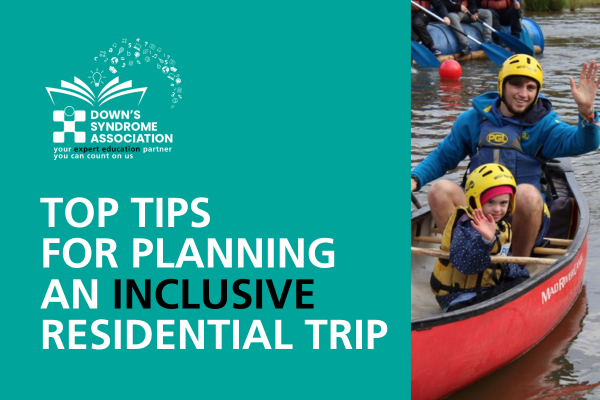Top tips for planning an inclusive residential trip
Every pupil in your school is entitled to full inclusion in school trips.
The Equality Act 2010 stipulates that schools must not discriminate in the way they afford pupils access to a benefit, facility or service – this includes residential trips.
Schools have an ‘anticipatory’ duty under the Equality Act, which means that they must think in advance about how to make their activities inclusive of all pupils in their school.
Excluding pupils who have Down’s syndrome from trips or treating them worse than other pupils, can be seen as direct or indirect discrimination.
Schools are required to make ‘reasonable adjustments’ to ensure that disabled pupils can access school trips, and they cannot ask parents to fund these adjustments.

For further information and guidance, please see the International Guidelines for the Education of Learners with Down’s syndrome.
We know that it can be a busy and stressful time for teachers who are planning residential trips, so we have set out our top tips for making sure your trip is inclusive of pupils who have Down’s syndrome:
Start with an assumption that pupils who have Down’s syndrome will be able to attend school residential trips – many have done so successfully.
Put all children who are disabled/have Special Educational Needs at the heart of your planning to ensure that everyone’s access needs are considered and that everyone will be able to take part.
Ensure that your budget for the trip includes any costs for accessible transport or required adaptations for activities.
Start planning early. It is important that you allow sufficient time to plan for an inclusive residential trip. This will allow time for planning adaptations or for staff training (eg in meeting medical needs).
Work with the family of the pupil who has Down’s syndrome as early as possible.
- Invite them to a meeting to discuss their aspirations and any concerns that they might have.
- Discuss their child’s specific medical or access needs, and work together to think creatively about how these can be met.
- Consider whether it would be helpful for the parents to visit the venue so that they can identify any adaptations that might be needed.
- Produce a one-page profile about the pupil who has Down’s syndrome together to provide to the activity provider and all staff attending the trip.
- Ensure you have open communication with parents before and during the trip, as they might find residential trips a worrying prospect!
- Do not ask the parents to attend the residential trip or to stay nearby unless you are asking all parents in your school to do this. You can invite them to visit or take their child home/to nearby accommodation overnight if they wish to, but ensure this is seen as optional and it is definitely not an expectation.
